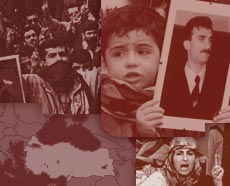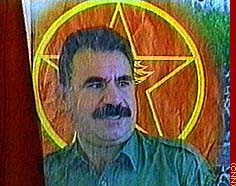

When Turkish secret agents swept down to arrest Kurdistan Workers' Party (PKK) leader Abdullah Ocalan in Kenya in February, it was more than the successful end to a long mission to hunt down the man who the Turkish government sees as its biggest criminal.
Ocalan's arrest after years as a fugitive has also focused the international spotlight on the question of human rights in Turkey itself -- ironically, the PKK leader's long-time aim.
How is it possible that this one man could play such a central role in spotlighting an entire country's unwillingness to adapt to the ways of the western world when it comes to issues of human rights?
The answer is complicated. For one thing, Ocalan's PKK is often described as a violent opposition force, charged with atrocities against children and those who are unable to defend themselves.
But Ocalan's case is being watched by people and political leaders around the world for another reason. The international audience is not as interested in the outcome as they are in the way the Turkish government, which itself has been charged with violating the basic rights of those who speak out against it, will conduct the proceedings.
European Union officials claim that Turkey, which for decades has been trying to gain entry into the EU, still does not have a "respectable" human rights record or a respectable record for ensuring fair trials to people who speak out, peacefully or not, against the Turkish government.
According to international observers like Amnesty International, in many cases, people who have dared to speak out against the government, even peacefully, have been imprisoned, or have disappeared.
While Turkey continues to press for membership in the EU, the European Parliament points to the country's record on human rights as the main reason for leaving the Turks out in the cold. The EU specifically objects to the government's treatment of the Kurds, the very people who Ocalan says he represents.
Eddie McVeigh, press officer for the European Parliament in London says that the EU will certainly be following the Ocalan trial with great interest. "The EU is monitoring the Turkish record on human rights very closely and obviously, this trial will be another stage in that process."
But McVeigh, like many members of the European Parliament, isn't exactly holding his breath when it comes to the outcome of the trial itself.

"The EU is always hopeful that Turkey will change. Whether or not the Ocalan trial will be the vehicle for that change, I don't know. After all, Mr. Ocalan will be tried under Turkish law. But the EU is optimistic that Turkey will take steps to bolster its record on human rights, and its relationship with the other EU countries."
But not everyone sees the trial the way that McVeigh, or perhaps the European Union, sees it. Germany is now home to the largest population of Turks living outside of Turkey.
Osman Medeni is a board member of the German-Turkish Cultural Society in Bonn. He says that the Ocalan trial is nobody's business, except Turkey's, and certainly not something that should be used to criticize the government.
"No, why should the trial put any sort of spotlight on Turkish human rights. The only people who will do that are people who are looking for a reason to criticize Turkey. Turkey is a country based on the rule of law and its laws apply to everyone." Medeni says that judging Turkey based on the Ocalan trial is unjust and an exercise in discrimination.
"The United States has the death penalty, but the European nations don't make much commotion about that," he adds.
But as the world turns its attention to the trial of Abdullah Ocalan there will be an unspoken dialogue between Turkey and its European Union neighbors, in terms of how much of a compromise each is willing to accept in forging a relationship.